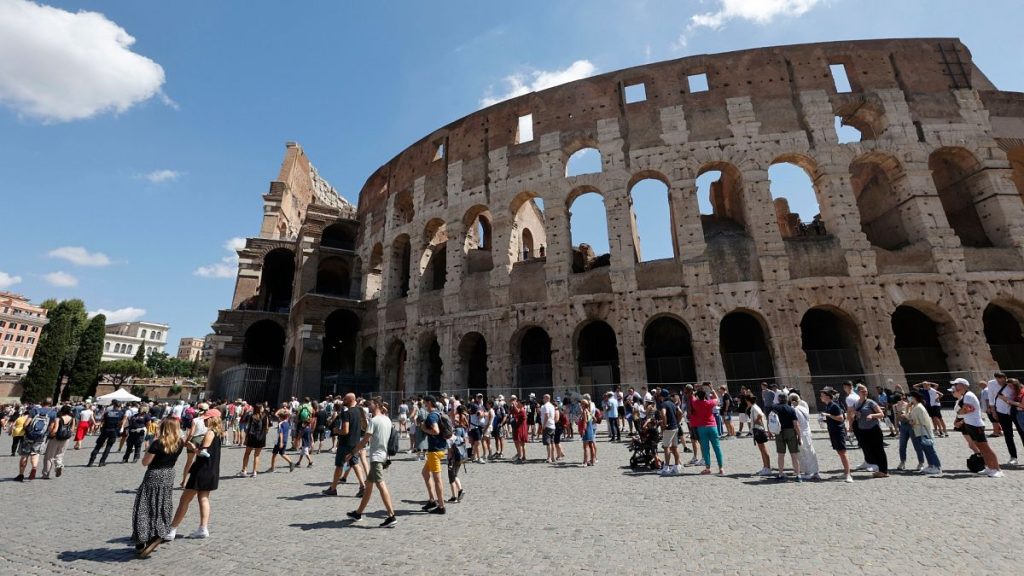In a significant crackdown on unfair ticketing practices, Italy’s competition authority has imposed fines totaling €20 million on six tour operators for ticket hoarding related to access to the Roman Colosseum. Following an investigation initiated in July 2023 triggered by numerous complaints from the public, the Antitrust Authority revealed that these practices resulted in the widespread unavailability of standard-priced tickets, forcing tourists to purchase higher-priced options. This decision comes amidst the Colosseum’s popularity as the most-visited monument in Italy, attracting millions of visitors annually.
| Article Subheadings |
|---|
| 1) Investigation Into Ticketing Practices |
| 2) Impact of Ticket Hoarding |
| 3) Fines Imposed and Their Justifications |
| 4) The Role of Tour Operators and Automated Systems |
| 5) Future Implications for Tourists and Ticket Buyers |
Investigation Into Ticketing Practices
The investigation began in July 2023 when Italy’s competition authority, ACGM, received a barrage of complaints from tourists and locals alike. Many reported difficulties purchasing tickets online to visit the famed Roman Colosseum at official prices. The investigation aimed to uncover the mechanisms behind these accessibility issues and to determine whether ticketing practices amounted to anti-competitive behavior. The authorities quickly identified that a significant part of the problem was the automation of ticket purchases, resulting in substantial unavailability of tickets for everyday visitors.
Impact of Ticket Hoarding
The ACGM found that the hoarding of tickets not only limited access to standard-priced tickets but also significantly inflated prices for most tourists. Many visitors were compelled to purchase expensive bundles, which included services such as guided tours or priority entrance tickets. This practice was deemed exploitative, especially as many people were unable to access basic pricing options that offered straightforward entry to the iconic site. The situation led to a public outcry, with many individuals expressing frustration over their inability to freely access one of the most historic landmarks in the world, a site that attracts over 12.3 million visitors annually.
Fines Imposed and Their Justifications
The fines totaling €20 million were levied against six different tour operators, with the Cooperative Culture Society receiving the largest penalty of €7 million. This hefty fine was for neglecting to take preventive measures against automated ticket purchases and for reserving a large proportion of tickets for its guided tours, further limiting availability for typical visitors. The authorities highlighted that such actions constituted a blatant attempt to manipulate the ticketing market, violating principles of fair competition and hurting the average tourist’s ability to access the site.
The Role of Tour Operators and Automated Systems
As part of their investigation, officials scrutinized the practices of several tour operators based in Italy, Germany, the Netherlands, and Ireland. They uncovered that these operators employed bots—automated systems designed to quickly and efficiently purchase large quantities of tickets, thereby monopolizing available tickets. This tactic significantly hampered individual tourists’ chances of obtaining tickets at standard prices, as available inventory was increasingly restricted. The use of these advanced automated techniques is seen as a growing issue across various sectors, yet the Colosseum case serves as a particularly high-profile instance that has garnered extensive public attention.
Future Implications for Tourists and Ticket Buyers
Looking forward, the imposition of fines represents a critical step toward ensuring fair access for all tourists wishing to visit the Colosseum. Authorities have indicated their commitment to monitoring ticket sales closely to prevent the reoccurrence of similar price manipulation problems. In parallel, it could prompt discussions about stricter regulations for ticket vendors and tour operators operating in popular heritage sectors. Ultimately, these measures aim to safeguard the interests of everyday visitors who seek to experience one of the world’s most iconic cultural landmarks without being hindered by unfair pricing practices.
| No. | Key Points |
|---|---|
| 1 | ACGM fined six tour operators a total of €20 million for ticket hoarding. |
| 2 | The investigation was initiated after public complaints regarding ticket accessibility. |
| 3 | Tourists faced challenges in obtaining standard-priced tickets. |
| 4 | Automated systems were used to monopolize ticket sales, creating unfair competition. |
| 5 | Future implications might include stricter regulations for ticket vendors. |
Summary
The Italian competition authority’s significant penalties against tour operators for ticket hoarding practices highlight a crucial moment for ensuring fair treatment of tourists at popular cultural landmarks. This initiative reflects a broader commitment to combat unfair competition and improve ticket availability to iconic sites like the Roman Colosseum. As officials continue to monitor ticket sales, these measures are anticipated to safeguard the interests of individual visitors while promoting transparency and accessibility in the tourism sector.
Frequently Asked Questions
Question: What triggered the investigation into ticketing practices for the Colosseum?
The investigation was triggered by a significant number of complaints from the public regarding difficulties in purchasing standard-priced tickets online, as many found them unavailable during peak times.
Question: How much was the largest fine imposed on a single tour operator?
The Cooperative Culture Society received the largest fine of €7 million for failing to prevent automated ticket hoarding and reserving too many tickets for its guided tours.
Question: What are the expected outcomes of the fines imposed on tour operators?
The fines are aimed at ensuring fair access to the Colosseum for all visitors, potentially leading to stricter regulations on ticket sales and a reduction in unfair pricing practices in the tourist sector.


